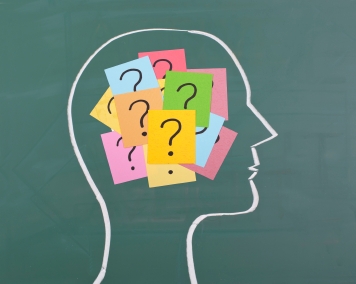Because adolescent athletes judge their readiness to return to play following a concussion based primarily on subjective symptoms, such self-reports should not be used as the sole factor in return-to-play decisions, say researchers at the University of Pittsburgh Medical Center and Vanderbilt in two recent studies.[1,7]
The research team in the first study [1] studied 101 concussed athletes (62 males, 39 females) ages 12 to 18, who were evaluated by clinicians at the UPMC Center for Sports Medicine Concussion Program. They asked athletes to rate their "percent back to normal." They compared those numbers against the ImPACT (Immediate Post-Concussion Assessment and Cognitive Testing) battery and somatic, cognitive, sleep and neuropsychiatric symptom clusters to find significant correlations. In short, the athletes' judgment was based on a small subset of the factors evaluated in concussion care.
They found that, when athletes gauge their own readiness to return-to-play, they rely most heavily on the absence of somatic (e.g. physical) symptoms such as headache, vomiting and visual disturbances - which are more apparent and easier for the athlete or those around them to directly observe - and much less on the more elusive and subtle symptoms of concussion such as "fogginess," difficulty concentrating or remembering, and slowed reaction time - symptoms which are harder for the athlete to detect. They also found that athletes' awareness of their cognitive decline after concussion is limited.
Gender differences
Males and females in the study showed significant differences in how they feel after sustaining a concussion, with males tending to report greater recovery from their concussions than females, but at the same time considering a greater number of factors in their self-report assessments of recovery from concussion. The findings, said the authors, suggest that females may experience more severe post-concussion symptoms than males (a view supported by several recent studies [2-4] and generally consistent with what Sandel and Lovell say they see in clinical practice), or that males under-report their symptoms.
Despite the breadth of literature on differences in the presentation of concussion in males and females, there is limited research rationalizing why these differences are observed, says lead author Natalie Sandel, B.S., of the Department of Neuroscience and Dietrich School of Arts and Sciences at the University of Pittsburgh. Are males underreporting symptoms or do they experience less severe postconcussion symptoms and does this reflect cultural issues (i.e., male machismo)? Do females lack insight into their injuries or is their experience of concussion completely different from that of males? Future research is needed to answer these questions.
She notes that several studies have examined sex differences in neurocognitive test performance but yielded inconsistent results. Some studies indicate females perform worse overall, whereas others suggest females may outperform males on tasks measuring verbal memory.[3,4] To further complicate the matter, a 2010 study demonstrated that a history of concussion affects males' and females' performances on neurocognitive testing differently. Therefore, although the current study supported previous findings of sex differences in concussion, additional research investigating why these differences occur is needed, Sandel says.
Cheerleaders under-report symptoms

In the second study [7] reseachers from UPMC and Vanderbilt found that among female high school cheerleaders with diagnosed concussion who reported after concussion being asymptomatic, a third (33%) had at least one abnormal indicator on the neurocognitive component of their ImPACT test compared to their baseline scores.
"The addition of neurocgognitive assessment appears to add significantly to the evaluation of cheerleaders with concussions and helps ensure that all baseline measures have normalized before clearance for a return to competition," writes lead author of the cheerleader study, Mark Lovell, PhD.
The cheerleader study is "thus consistent with [the earlier study documenting] the value added of neurocognitive testing in addition to the reliance on athlete self-reports ... that might not always agree with symptom self-report. ... If a complete return to cognitive and symptom baseline status is a prerequisite for return to competiion," Lovell writes, "then these results suggest a reliance on symptom report alone may be insufficient." [Lovell, it should be noted is the author of the ImPACT test used in both studies].
Caution urged
In discussing the results of the 2012 study, Sande noted that, "The results of the study indicate youth athletes are basing their perceptions of recovery from concussion primarily on overt, physical symptoms such as headache and nausea, and may neglect to consider the cognitive symptoms of the injury, says
"Relying solely on adolescents' self-reported symptoms for return-to-play and concussion management decisions is ill-advised as their perceptions may include only a small subset of the deficits commonly seen after concussion. These findings further highlight the importance of using objective measures for the assessment of concussion," Sandel says.
Her recommendations were echoed by Lovell in the cheerleader study: "This study demonstrates that even athletes who report being symptom-free may continue to exhibit neurocognitive deficits of which they are either unaware or are failing to report. Furthermore, our data suggest that if neurocognitive testing is unavailable, then the treating physician should be cautious in returning athletes to play based on their self-report of symptoms alone."
Indeed, notes sports concussion neuropsychologist and MomsTEAM expert Rosemarie Scolaro Moser, PhD, in her 2012 book, Ahead of the Game, it is such unreliability that is the basis for a "widespread belief among medical professionals that athletes should not be returned to play after a suspected concussion, based solely on the likelihood that self-reporting is unreliable."
William P. Meehan, III, MD, another MomsTEAM expert who, like Moser, is featured in MomsTEAM's new PBS documentary, "The Smartest Team: Making High School Football Safer," agrees that post-concussion neurocognitive testing should be used by clinicians in making return to play decisions: "The truth is that 20 to 30% of athletes ... will report being symptom free before their brain function has returned to [their] own personal baseline values, so that if you don't do that testing, you run the risk of returning 20 to 30% of concussed athletes back to sports before they are fully recovered."
Caution urged
"Sports medicine practitioners should be cautious when considering athletes' self-reported symptoms in their return-to-play decisions," Sandel writes. Because "adolescent athletes are considered a high-risk population for sustaining an additional injury or long-term damage following sports-related concussion, it is crucial for practitioners to prevent symptomatic athletes from returning to play. To ensure a more cautious return-to-play decision, a multidisciplinary approach [as recommended in the most recent international consensus statement of concussion experts [5] that includes objective neurocognitive testing is advised," she says.
"These research results affirm what we see daily in our clinical experience," said Michael "Micky" Collins, Ph.D., the UPMC Concussion Program's executive and clinical director. "Athletes have a hard time understanding the cryptic nature of this injury, and relying only on self-assessment of symptoms is dangerous and naïve when it comes to allowing athletes back to play after a brain injury. Objective assessment through the use of computerized neurocognitive testing and a thorough evaluation are critical components of concussion management and return-to-play considerations."
Collins' view was echoed by study co-author, Mark R. Lovell, Ph. D., FACPN, then with the Pitt Department of Orthopaedic Surgery. "Neurocognitive testing provides a more objective method of measuring recovery from concussion and represents a valuable component of the return to play decision making process. Neurocognitive testing represents an important tool in the toolbox when clinicians are faced with making difficult return to play decisions."
Post-exertion neurocognitive testing recommended
A third recent study [6] provides additional support for the view that athletes should not be returned to play based solely on reporting being asymptomatic. It found that, among concussed student-athletes who reported no symptoms and even had returned to baseline on computerized neurocognitive tests taken before beginning a graduated return to sports protocol,[5] which requires that athletes be asymptomatic and have returned to baseline, more than a quarter (27.7%) exhibited declines in verbal and visual memory on the tests after moderate exercise.
Those findings prompted the authors of that study, led by sports concussion neuropsychologist Neal McGrath, Ph.D. of Sports Concussion New England, to recommend that neurocognitive testing become an "integral component of the athletic trainer's post-exertion evaluation protocol and that student-athletes should not be cleared for full contact activity until they are able to demonstrate stability, particularly in memory functioning, on such post-exertion neurocognitive concussion testing."
Such post-exertion testing is not currently the standard of care as part of return to play guidelines.
1. Sandel N, Lovell M, Kegel N, Collins M, Kontos A. The Relationship Of Symptoms and Neurocognitive Performance to Perceived Recovery From Sports-Related Concussion Among Adolescent Athletes. Applied Neuropsychology: Child. 2012; DOI:10.1080/21622965.201 2.670680 (published online ahead of print 22 May 2012)(accessed June 5, 2012)
2. Covassin T, Elbin R, Harris W, Parker T, Kontos A. The Role of Age and Sex in Symptoms, Neurocognitive Performance, and Postural Stability in Athletes After Concussion. Am. J. Sports Med. 2012;20(10); published on April 26, 2012 at DOI:10.117703654651244454
3. Colvin AC, Mullen J, Lovell MR, West RV, Collins MW, Groh M. The Role of Concussion History and Gender in Recovery from Soccer-Related Concussion. Am. J. Sports Med. 2009;37(9): 1699-1704.
4. Covassin, T, Elbin, R.J., Larson, E., & Kontos, A.P. Sex and age differences in depression and baseline sport-related concussion neurocognitive performance and symptoms. Clinical Journal of Sports Medicine 2012;22(2):98-104.
5. Concussion Statement on Concussion in Sport: the 3rd International Conference on Concussion in Sport held in Zurich, November 2008, P. McCrory et. al, Br. J. Sports Med. 2009; 43; i76-i84.
6. McGrath N, Dinn WM, Collins MW, Lovell MR, Elbin RJ, Kontos AP. Post-exertion neurocognitive test failure among student-athletes following concussion. Brain Injury 2013;27(1):103-113.
7. Lovell MR, Solomon GS. Neurocognitive Test Performance and Symptom Reporting in Cheerleaders in Concussions. J Pediatrics 2013. DOI: 10.1016/jpeds.2013.05.061 (epub September 2013).
Posted June 15, 2012; revised July 10, 2012 to include Dr. Moser's comment; revised February 7, 2013 to include study in Brain Injury (footnote 6); revised September 16, 2013 to include study in Journal of Pediatrics (note 7) and video of Dr. Meehan.









